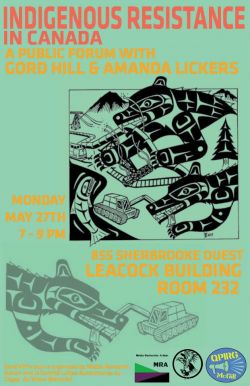Coop média de Montréal
Journalisme indépendant
- Action directe
- Éducation
- Environnement
- Governance
- Autochtones
- Solidarité
- Amanda Lickers
- anticolonialisme
- gord hill
- Ligne 9
- luttes autochtones
Montréal
Résistance autochtone au Canada: Une conférence de Gord Hill et Amanda Lickers
Indigenous Resistance in Canada: A public forum with Gord Hill and Amanda Lickers

7:00pm
Lundi Mai 27 2013
» View map
» More information
(English bellow)
Histoire et luttes actuelles des peuples autochtones dans l'État-Nation du Canada, présenté par Gord Hill
Loin d'être apathiques, les peuples autochtones au Canada ont une longue histoire de résistance anti-coloniale qui se poursuit. Cette présentation inclut une histoire de la résistance anticoloniale dans les Amériques et des luttes actuelles menées par des peuples autochtones, avec un focus particulier sur celles qui ont lieu au Canada et particulièrement dans la province de la «Colombie-Britannique» (incluant contre les pipelines, dans le cas des femmes tuées/violées/disparues, sur la Loi sur les Indiens de 1876, sur les traités, sur Idle No More, etc.)
Nous discuterons aussi des liens qui existent et qui peuvent exister entre ces luttes anticoloniales menées par des autochtones et l'implication actuelle et possible des non-autochtones. Comment les non-autochtones peuvent être solidairement en lutte avec les autochtones anticolonialistes et quels sont les aspects positifs et négatifs de cette implication ? Aussi, nous aborderons le lien qui unit ces luttes et les autres luttes systémiques contre les différents systèmes d'oppression.
Gord Hill est membre de la nation Kwakwaka'wakw et auteur du The 500 Years of Indigenous Resistance Comic Book. Il écrit sous le nom de Zig Zag à warriorpublications.wordpress.com.
Résister contre la ligne 9 et honorer le sacré, présenté par Amanda Lickers
Le renversement de la ligne 9 par l'industrie de la marchandisation et de la consommation est un assaut contemporain contre la souveraineté et l'autodétermination des autochtones. Prolongeant la vision d'un monde qui sépare le monde naturel de l'humanité, le renversement de la Ligne 9 poursuit la colonisation des terres et des peuples autochtones en transportant le bitume dilué des sables bitumineux à travers la région des grands lacs – ce qui représente une menace accentuée contre le traité appelé Sewatokwasera't ou Gdoo Naaganinaa (Le plat avec une seule cuillère), un des traités les plus longs existant entre les nations souveraines Onkwehon:we dans le corridor du Nord-Est. Cette présentation discutera des conséquences qu'aurait le renversement de la ligne 9 sur la souveraineté autochtone et des moyens avec lesquels les peuples Onkwehon:we mobilisent contre la destruction continue d'Ionkhi'nisten:a (la Terre-Mère).
Amanda est une anarchaqueer Onkwehon:we cisfemme, elle appartient au Clan de la tortue de la nation Onondowaga, partie de la Confédération Haudenosaunee. Elle se concentre à combattre l'écocide, à haïr la police et à récolter des médecines – Amanda espère oeuvrer à démanteler tous les systèmes d'oppression. Amanda vit à Nogojiwanong, mais elle ira à Ohsweken à l'automne pour décoloniser sa bouche, focussant sur l'acquisition du langage Kanien'keha tout en sortant l'anglais de son cerveau. O'nen!
** Cette tournée de Gord Hill est organisée par Média Recherche Action et le Comité Luttes Autochtones au Cégep du Vieux-Montréal **
* * *
Indigenous Resistance in Canada
A public forum with Gord Hill and Amanda Lickers
Historical and Current Struggles by Indigenous Peoples in the Nation-State of Canada, presented by Gord Hill
Far from being "idle," Indigenous peoples in Canada have a rich history of anti-colonial resistance that continues to this day. This presentation will include a history of Indigenous anti-colonial resistance in the Americas and current struggles being waged by Native peoples, with a focus on those occurring in Canada as well as the province of 'British Columbia' (including anti-pipelines, missing/murdered women, the 1876 Indian Act, treaties, Idle No More, etc.).
We will discuss also the links that can exist between these anticolonial struggles initiated and led by indigenous peoples and the actual and possible involvement of non-indigenous peoples. How non-indigenous peoples can be struggling in solidarity with the anticolonial indigenous peoples and what are the positive and negative aspects of this involvement ? We will also adress the relation between these struggles and other systemic battles against all forms of oppression.
Gord Hill is a member of the Kwakwaka'wakw nation and author of The 500 Years of Indigenous Resistance Comic Book. He writes under the name Zig Zag at warriorpublications.wordpress.com.
Resistance to Line 9 & Honouring the Sacred, presented by Amanda Lickers
The proposed Line 9 reversal by the Commodify & Consume Industry is a contemporary assault on Indigenous nationhood and self determination. While furthering a worldview that positions the natural world as "other" to humanity, the Line 9 reversal continues the colonization of Indigenous lands and peoples by shipping Tar Sands diluted bitumen across the Great Lakes region - presenting an escalated threat to the Sewatokwasera't and Gdoo Naaganinaa (Dish with One Spoon), one of the longest standing treaty agreements between sovereign Onkwehon:we nations in the Northeastern Corridor. This presentation will discuss the implications of the Line 9 reversal on Indigenous nationhood and discuss ways in which Onkwehon:we peoples are mobilizing against the ongoing destruction of Ionkhi’nisten:a (Mother Earth).
Amanda is an anarchaqueer Onkwehon:we cis-woman. She belongs to the Turtle Clan of the Onondowaga nation, part of the Haudenosaunee Confederacy. Focusing on combating ecocide, hating the police, and harvesting medicines, Amanda hopes to work towards dismantling all systems of oppression, slashing at their social, cultural and material infrastructures. Amanda is currently based in Nogojiwanong but will be headed to Ohsweken in the fall to decolonize her mouth, focusing on Kanien'keha language acquisition while blowing the English language out of her brain. O'nen!
** Gord Hill's tour is organized by Media Research Action and le Comité Luttes Autochtones au Cégep du Vieux-Montréal **
About the poster
Has posted 50 times.
View Média Recherche Action's profile »
Recent Posts:
Média Recherche Action ()
Member since Mai 2012
About:
Média Recherche Action est un collectif de recherche et d'éducation, de production audio, d'ateliers, de textes, de traductions, de diffusion électronique, bientôt de vidéos et de photographies... Nous réalisons et réaliserons entrevues, reportages, couvertures d'événements, documentaires... Ce collectif est dédié à diffuser de l'information pertinente aux individuEs, activistes, organisations (…) préoccupéEs par la défense de la terre et de sa biodiversité ainsi que par la protection et la création de modes de vie soutenables tout comme de relations égalitaires entre les humainEs. Le projet Média Recherche Action a pour objectif d'enquêter sur différentes situations d'oppression et de destruction environnementale ainsi que de contribuer à faire connaître une diversité de luttes anticolonialistes, féministes, anticapitalistes, anticivilisationnelles (…) qui s'y opposent. Média Recherche Action visera aussi à organiser mensuellement un cabaret d'actualités mettant de l'avant des performances artistiques radicalement engagées, des présentations multimédia, des projections visuelles et sonores, des lectures, des interventions, des expositions... Avis à celles et ceux qui seraient intéresséEs à nous recevoir dans leurs espaces ! Pour communiquer avec nous: media.recherche.action@riseup.net Aussi sur facebook: http://www.facebook.com/MediaRechercheAction Nous diffusons plein d'actualités,d'analyses, d'événements... sur notre fil d'actualités : http://www.facebook.com/pages/Diffusion-M%C3%A9dia-Recherche-Action/373614469398028?ref=hl Suivez-nous aussi sur Dailymotion.com à http://www.dailymotion.com/mediarechercheaction * * * Media Research action is a collective that performs a wide range of activities, including research and education, audio production, workshops on a variety of topics, texts and translations, online distribution, videography and photography (soon). We produce documentaries as well as cover events and do interviews and reporting. The collective is dedicated to broadcasting relevant information to individuals, activists, organizations, etc that are concerned with defending the land and its biodiversity, as well as the creation and protection of sustainable livelihoods and egalitarian relationships between humans. The Media Research Action project aims to investigate into different situations of oppression and environmental destruction as well as raise awareness about a variety of anti-colonial, feminist, anti-capitalist, anti-civilization etc struggles who oppose them. Media Research Action will also seek to organize monthly cabarets, bringing forward radically committed artistic performances, visual projections and readings, interventions, exhibits... Anyone interested in welcoming us in their space are encouraged to get in touch with us. To contact us: media.recherche.action@riseup.net Also on facebook: http://www.facebook.com/MediaRechercheAction We are also disseminating information, analysis, events... on this other Facebook page : http://www.facebook.com/pages/Diffusion-M%C3%A9dia-Recherche-Action/373614469398028?ref=hl Follow us also on Dailymotion.com at http://www.dailymotion.com/mediarechercheactionThe site for the Montreal local of The Media Co-op has been archived and will no longer be updated. Please visit the main Media Co-op website to learn more about the organization.



